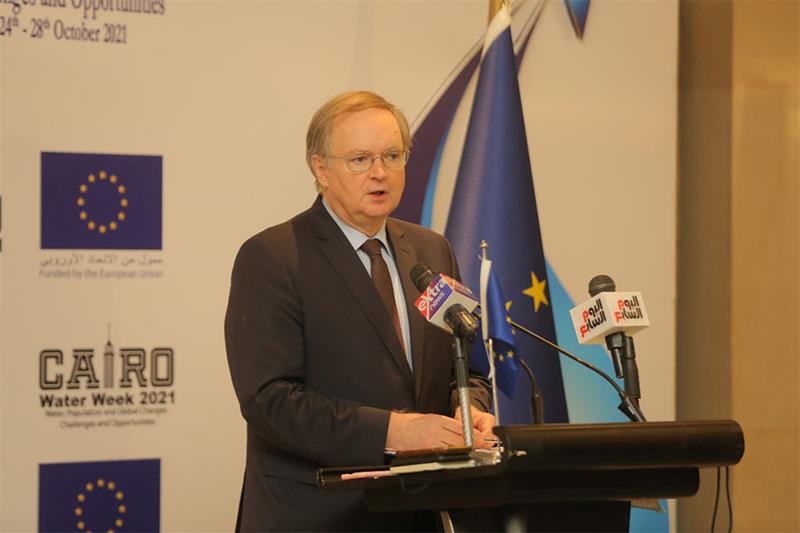
Head of the European Delegation to Egypt Ambassador Christian Berger speaks during a press conference on Thursday 28 October, 2021. Al-Ahram
Berger said that the two actions are very important signals of positive developments in the country, adding that the EU is awaiting the on-the-ground results of the strategy.
Berger made his statements during a press conference at the conclusion of Cairo Water Week that took place in the Egyptian capital from 24 to 28 October.
President Abdel-Fattah El-Sisi announced on Monday that he would not extend the state of emergency that had been renewed every three months since two churches in northern Egypt were subjected to terrorist attacks in April 2017.
In mid-September, the president launched the National Strategy for Human Rights by which the state aims to develop a comprehensive approach to human rights as an integral part of implementing the country's national development project.
GERD file
Berger also tackled the dispute between Egypt, Sudan and Ethiopia over the Grand Ethiopian Renaissance Dam (GERD), which Addis Ababa has been building on the Blue Nile since 2011.
“The EU believes the three Nile Basin countries should reach an agreement on the GERD issue,” the head of the EU delegation in Egypt asserted.
He declared that the EU special representative for the Sahel, Emanuela Claudia Del Re, who has been appointed to the post from 1 July 2021 until 30 August 2022, is due to visit Egypt within a few weeks.
Her visit aims to follow up on recent GERD developments with Egypt’s Foreign Minister Sameh Shoukry, as the EU is an observer for GERD negotiations, Berger said.
The African Union-sponsored talks between the three countries reached a deadlock in April after a failed round in Kinshasa, followed by Addis Ababa's unilateral decision to commence with the second filling of the dam despite the objections of the downstream countries.
The two downstream countries call for a legally binding agreement on the filling and operation of the dam, a demand that has been endorsed by a UN Security Council presidential statement last month but is still resisted by Ethiopia.
Meanwhile, the three countries have showed a desire to continue the talks under the auspices of DR Congo, as current head of the African Union this year.
EU flagship strategy for Egypt
Answering a question from Ahram Online on the main aspects of the EU flagship strategy for Egypt, which is currently being developed in partnership with Egypt for the coming four years, Berger clarified that it revolves around the same priorities of the strategy that ended in 2020, putting into consideration the recent developments that occurred during the past years, including the COVID-19 crisis and climate change.
He also noted that it focuses on supporting the country’s second waves of reforms, boosting Egypt’s Vision 2030, enhancing multilateralism in securing finances for development projects, coping with the socio-economic impact of the pandemic and pushing forward the green transition, in addition to supporting women’s empowerment.
Meanwhile, Berger said that Egypt is a great place for investment, adding that the EU is willing to increase European investments in the Egyptian market by tapping into all its opportunities.
“EU can’t bring investors to the Egyptian market, but it is working with the government of Egypt for the sake of making the investment atmosphere better. We see positive actions taken in Egypt, such as approving the new tax law and the new companies law that aim to create a better environment for investors,” Berger illustrated.
He also noted that as of 2021 the EU made the financial instruments it provides for North Africa available for the entire continent, adding that the Cairo Water Week is an example of the possibilities that could be expanded upon regarding the EU commitment to Africa.
Cairo Water Week
Berger said that the Cairo Water Week event, which is supported by the EU, is an international hub for water management and a critical platform for government, private sector and the development partners to make progress in the water sector amid the ongoing challenges.
With the participation of ministers, official delegations, senior officials in the water sector, scientists, international organisations, and leading financial institutions, as well as civil society and NGOs, the annual event of Cairo Water Week aims to spread awareness on water issues and promote innovation to face the most pressing water-related challenges.
The participants discussed policies appropriate to water-scarce countries for achieving the UN Sustainable Development Goals (SDGs), advances in water management, governance and strategic planning.
Wastewater reuse and water recycling for agriculture in Egypt as well as various means of financing water projects were also highlighted at the event.
Short link: